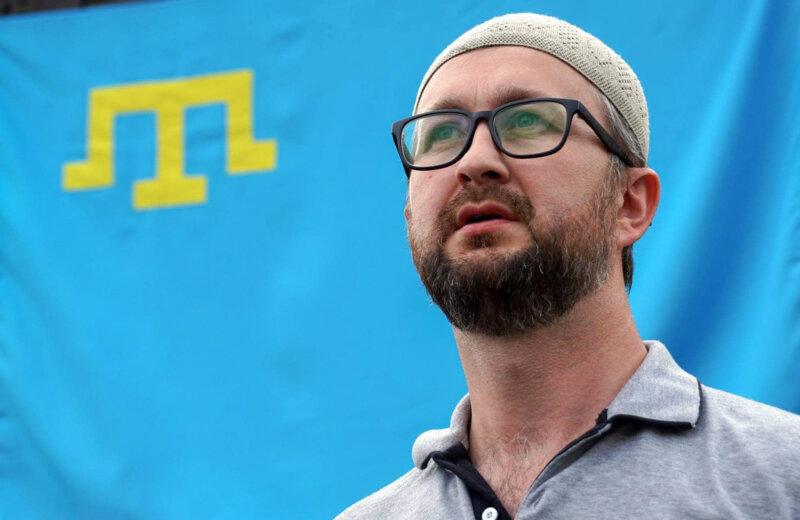Russian authorities in occupied Crimea raided five Crimean Tatar households, arresting five men, among them Nariman Dzhelyalov, the first deputy head of the Mejlis – the representative assembly of Crimean Tatars, non-profit Crimean Solidarity reported.
On Sept. 3, the occupants searched the houses of Eldar Odamanov and Aziz Akhtemov; they were arrested and taken to an unknown location. On Sept. 4, occupational authorities came to the houses of Shevket Useinov, Asan Akhtemov, and Nariman Dzhelyalov, and arrested them, too. Their location also remains unknown.
The reasons for the arrests of Useinov, Akhtemov, and Dzhelyalov are not clear. Odamanov’s arrest was connected to an explosion on a gas pipeline in the village of Perevalny, Crimean Solidarity reports.
It is likely that all men will face the same charges somehow related to the explosion, but nothing has been confirmed yet, Crimean lawyer Lilia Gemedzhy told the Kyiv Post.
On the evening of Sept. 4, dozens of people came to Russia’s Federal Security Service building in Crimea to demand information about the arrestees, as their locations remained unknown.
In response, the occupants arrested around 40 people at once, most Crimean Tatars and family members of those arrested, as well as local journalists, packing them up into a bus and taking them to different police stations.

Dozens of the National Guard of Russia officers stand near the Russian Federal Security Services building in Simferopol, a city in occupied Crimea, on Sept. 4. Large numbers of people, most Crimean Tatars, came to demand information about five Crimean Tatars arrested earlier whose locations remained unknown, for which at least 40 people were arrested, packed into a bus and driven to police stations.
Activists and lawyers perceive arrests as the Kremlin’s continuous persecution of Crimean Tatars for their faith and defiance of the occupation.
“Of course, the real reason for the searches and detentions that took place in Crimea on Sept. 3 and 4… is the Kremlin’s revenge for Ukraine’s successful mobilization of the international community, especially the Crimean Platform’s founding summit to counter Russian aggression against Ukraine and Crimea’s de-occupation,” the head of the Medjlis Refat Chubarov wrote on Facebook.
Crimea Platform summit, held for the first time on Aug. 23, 2021, united representatives of 46 countries in Kyiv, where they signed a joint declaration and committed to maintaining pressure on Russia to end the occupation of Crimea.
Dzhelyalov was a speaker during the summit.

Nariman Dzhelyalov, first deputy head of the Crimean Tatar Mejlis, was a speaker at the Crimea Platform summit in Kyiv on Aug. 23. Weeks later, he was arrested by Russian authorities in occupied Crimea. (Nariman Dzhelyal/Facebook)
Russia’s Foreign Ministry has threatened participants of the event in the past, warning that the participation will be perceived as “encroachment on Russia’s territorial integrity.”
In 2016, Russia listed the Mejlis as an extremist organization for the use of “propaganda of aggression and hatred towards Russia, inciting ethnic nationalism and extremism in society.”
The head of Mejlis, Refat Chubarov, has been sentenced, in absentia, to 6 years in prison by the so-called Supreme Court in Crimea on the charge of organizing mass riots, an accusation related to the role he played in resisting the occupants in 2014.
Chubarov fled to Kyiv shortly after the annexation.
“The occupying state is once again persecuting and intimidating Crimean Tatars. Searches of Ukrainian citizens’ homes are a gross violation of international norms,” said Ludmila Denisova, the Ukrainian parliament’s commissioner for human rights.
The arrests in Crimea once again showcase the continuous effort by Russia to persecute ethnic and religious minorities on the peninsula it has occupied since 2014.
Nearly half of all political prisoners during the occupation are Crimean Tatars, according to the Crimean Tatar Resource Center.
Most persecuted Crimean Tatars, a native ethnic minority in Crimea, are thrown to prisons for terrorism and extremism due to their alleged connection to Hizb ut-Tahrir – an islamic organization, which works legally in most European countries and Ukraine, but is banned in Russia.



